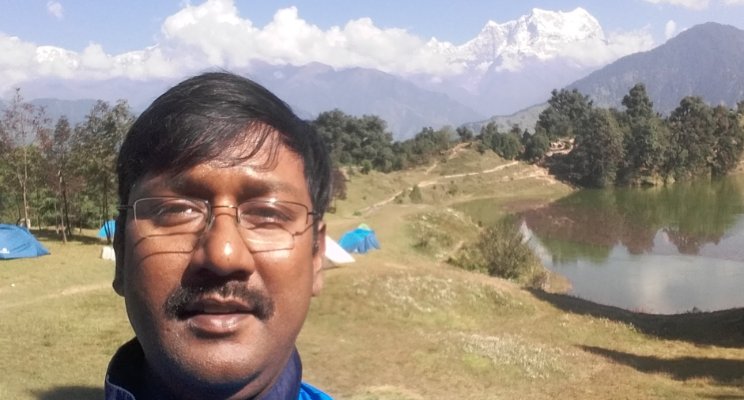
Five Questions with Subir Sen from the Indian Institute of Technology Roorkee India, who received a grant from the Global Development Network to study "Understanding farmers risk perceptions and farm-level risk management policies in India: Do policies serve their requirement?" He was selected for a workshop on “Eliciting Subjective Beliefs and Risk and Time Preferences in Developing Countries” hosted by the Centre for the Study of African Economies (CSAE) at the University of Oxford. He says that the project has “not only enabled me to be in touch with economists working on behavioral issues but also with practitioners in the field. I am now able to relate (to) and understand the relevance of issues, such as gender, which were not initially part of my project proposal.”
Q. Climate Change. Every citizen needs to know the dangers it poses to the environment. Could you elaborate on this message?
Based on my interviews with families in Uttarakhand, India, during 2016-17, I observed that citizens are aware of global warming, weather variability and extreme climatic conditions. Many shared their own suffering and described the stress on their lives and livelihood due to extreme climatic conditions. Yet, the term “climate change,” surprisingly, evokes a mixed response. Partly because many assume that change is inevitable and mostly follows a trend. We have to make a conscious effort to disentangle the myth regarding 'inevitable change,' i.e., seemingly disconnected and unaided by humans and a 'developmental trend' that is harming the environment and, which humans are causing. We also need to communicate what actions are valuable, and to do this in simpler language. Awareness about risks to livelihood, health and the environment are most important. Public discussions and social media campaigns are also very important.
Q. What is your GDN supported research about?
The research project funded by GDN is an attempt to empirically test the relationship between risk perception and agricultural productivity. The current research project is based on primary and secondary data with field surveys and experiments proposed in the states of Uttarakhand and Punjab. Uttarakhand is a hilly state and the most agricultural suffering due to climate variability. Punjab too has witnessed marginal slow-down in productivity, but the farmers have a tendency to 'nudge' the risks associated with climate change. Therefore, the hypothesis to be tested is whether farmers risk perception positively affects farm productivity. Districts with high and low productivity have been selected for the experiment, but it is yet to be administered. The study is a little behind schedule due to unforeseen events, but will be back on track soon. Meanwhile, GDN has helped me to refine the methodology of the study, prepare the field survey and the experimental design, which is something I am attempting at a large scale for the first time. Results will have implications for local level risk management practices, understanding and appropriateness of policies and farmers' perception towards future risks, for identifying existing gaps (needs assessment) and for designing policies according to local needs.
Q. Is there time for more research, or do we need more action? What research is urgently needed now?
In my personal opinion, it is time for more action research. During our pilot efforts to find a suitable experimental design, we realized that behavioral issues clearly dominate farmers’ decision making and that they are not a homogenous group. They display a varying risk attitude, even smaller locales, over time. Incentive based research does help to delve deeper, but an optimal incentive level is difficult to ascertain. For example, the desire for more money may produce a bias. This means that carefully crafted experimental designs may not always produce a dependable result. In an action research project, however, faster gains may be made. For instance, rather than instructing farmers to use less pesticide or insecticide, which highly contaminate water and affect other species/useful organisms, action research should be conducted to help farmers to realize the non-sustainability of their actions.
Q. You attended an international climate resilience event, hosted by GDN in partnership with the UNFCCC in New Delhi. What did you learn?
There were three key learnings for me. One, there is a fair understanding of climate resilience across different stakeholders and its time that we consolidate these understandings. I learnt about several initiatives which directly or indirectly may enhance resilience. Two, every stakeholder recognizes the importance of understanding individual perceptions towards climate risks. Three, the concept of climate resilience is much broader as compared to climate change adaptation (CCA) and disaster risk reduction (DRR) and therefore may require special focus in the days to come.
Q. If you could say one thing to a policymaker who could impact climate resilience in India, what would that be?
I would say, "Understand local (traditional and indigenous) and global best practices to minimize climate change impact, and frame public policies that do not undermine the needs of a developing society to build resilient societies."
In conversation with Madhuri Dass Woudenberg, Head of Communications, Global Development Network, December, 2017.





